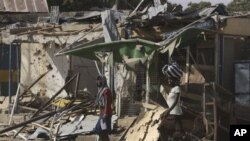Even though Islamic radicals in northern Nigeria continue attacks and are so far resisting offers of dialogue, analysts closely following the violence say negotiations will be essential in any solution.
With deadly violence involving radicals in northern Nigeria taking place on a near daily basis, Boko Haram leaders appear on the Internet and are quoted in newspapers refusing recent Nigerian government offers of dialogue.
On the YouTube website late last week, an audio recording attributed to the self-proclaimed Boko Haram leader Abubakar Shekau warned that the radicals would begin bombing secular schools and universities in retaliation for recent security and vigilante attacks on mosques and Koranic schools.
Increasingly, Boko Haram leaflets calling for the imposition of Islamic Sharia law are being distributed in major northern Nigerian cities.
The new threats and communications strategy come amid increased warnings by government officials in Nigeria and neighboring countries that Boko Haram is linking up with outside terrorist organizations, such as al-Qaida in the Islamic Maghreb and Somalia's al-Shabab extremists.
Despite the deteriorating situation, Carl LeVan, a Nigeria expert at American University in Washington, says dialogue is the best solution. He says any major security crackdown by Nigeria's government, with possible help from other African countries or the United States, would make the situation worse.
"A strategy that militarizes the conflict and reduces the opportunities for negotiations will, in fact, facilitate the internationalization of the conflict. In other words, it is not clear that there are significant ties to some of the more global violent Islamist movements at this point, but solutions and strategies which push Boko Haram towards more violence and which make offers of diplomacy seem less credible will certainly become a problem down the road,” Levan said.
Analysts say the movement and its grievances are local, but that Boko Haram as well as Nigerian and regional officials have an interest in making it seem much broader to gain attention and possible outside funding.
Last week, Nigerian President Goodluck Jonathan said he wanted to open a dialogue, but that he doubted Boko Haram leaders would come forward. He compared them to the world's most elusive terrorists, such as former al-Qaida leader Osama bin Laden.
John Campbell, who studies Boko Haram at the New York-based Council on Foreign Relations, says that simplifying who the Nigerian radicals are might be part of the problem.
"I do not think Boko Haram is a coherent organization. It is rather a movement, a grassroots insurrection against the secular government in Abuja, but also against the traditional northern Islamic establishment which its adherents see as not being really Islamic at all and one that basically exploits the poor populations in the north,” Campbell said.
Boko Haram grew out of a violent Muslim fundamentalist Salafist movement initially called the Taliban. Its best known leader, radical cleric Mohammed Yusuf, was killed in 2009 while in police custody during a Nigerian security crackdown that killed at least 600 followers. Analysts and Nigerian officials say that after the crackdown, several radical leaders struggled to become the head of the movement.
Criminal syndicates, some loosely affiliated and others not linked to the movement, have also claimed to speak on behalf of Boko Haram, which means “No to Western education.” The name itself did not come from the radicals, but from Nigerian media and government officials who sought to make fun of them.
The escalating violence comes amid a sense of growing economic and political marginalization in northern Nigeria, following a series of controversial national elections. Economists say the number of people living in poverty in the Muslim-dominated north is three time higher than in the mostly Christian south, which is home to President Jonathan.
Deirdre LaPin of the University of Pennsylvania took part in a recent Washington panel about Nigeria's problems. She said a key to ending the Boko Haram threat should also involve main northern politicians.
"Their marked silence in the face of some of the most egregious attacks by Boko Haram and others in the north suggests that they are not using their authority to control these activities at all," Lapin said.
Analysts say new development policies in northern Nigeria and better local governance are also desperately needed. Unless this happens, they warn, more young unemployed northern Nigerians could be attracted by Boko Haram's anti-government messages and violent tactics, making the problem even more severe.




